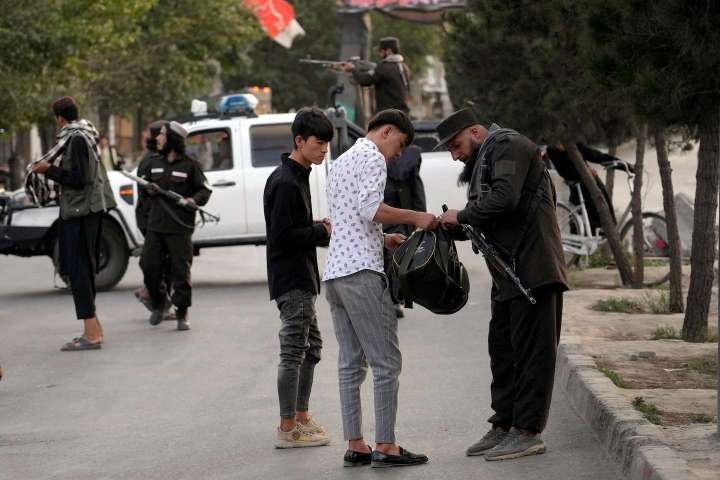KABUL — A top leader of the Pakistani Taliban militia was reported killed Sunday in southeastern Afghanistan, potentially dealing a serious blow to peace talks being negotiated between the extremist group and Pakistani officials with assistance from senior Taliban leaders in Afghanistan.
Top Pakistani Taliban leader killed in Afghanistan; Shiites targeted in Kabul

The reported death of Khorasani followed months of talks that began shortly after Afghan Taliban forces took power in Kabul one year ago. Numerous delegations have met in Afghanistan since then to help end the years-long conflict between Pakistani forces and hard-line Pakistani militants.
In the capital, Kabul, Taliban authorities have been struggling to contain a rash of terrorist attacks on the Shiite Muslim community over the past week. The attacks, mostly claimed by Islamic State militants, have sown panic in the Shiite Muslim community as it observes a period of religious mourning for a revered figure: Imam Hussein, a grandson of the prophet Muhammad slain in battle in the 7th century.
Taliban officials had promised to protect the community’s 10-day mourning tradition, which was due to culminate Monday with processions and funereal music, bringing tens of thousands of people into the streets. But after the third attack Saturday, a bombing in the heart of the Shiite community, officials virtually shut down the activities for fear of further violence.
On Monday morning, police cut off the area to all outside traffic and banned all local traffic. Roadside displays of brilliant religious flags and banners were taken down, and security forces in armored vehicles, some mounted with machine guns, continually patrolled the near-empty streets.
Taliban officials also cut off all local cellphone signals across Kabul on Monday to prevent remote-controlled bombings. Two of the recent terrorist attacks involved bombs that were hidden in ordinary objects in separate crowded areas of the Shiite community and were detonated remotely.
“People here are very afraid now after what has happened, but still they have strong feelings that they must come out and honor Imam Hussein,” said Habib Rezaie, 45, a travel agent. “He was a great hero for the world, not only for Islam. But I think in these circumstances, it would be better if people stay home and not express that love so extravagantly.”
Among the few pedestrians who dared come out on the streets Monday were some female medical students who were supposed to report for an exam. They hurried nervously along the sidewalk, clutching papers and exam books, just two blocks from the site that was bombed on Saturday.
“We are all scared. Our parents didn’t want us to go out, and we thought the Taliban might not give us permission, but we have to take these exams. It’s for our future,” said one student, 23, who gave her name only as Salaina.
Taliban officials have been struggling for months to respond to the Shiite community’s concerns about continuing attacks from the Islamic State, an extremist Sunni Muslim group that has repeatedly staged attacks in Kabul and other cities since the Taliban took power last August. In April, it bombed a large high school and a crowded shrine.
Last Wednesday, in an especially brazen attack, the militants commandeered an apartment building and started shooting at a Taliban security patrol after reportedly taking some residents hostage. It took government forces nearly seven hours to quell the assault.
Now, in attempting to prevent worse violence, Taliban authorities face an awkward balance between protecting local Shiites — a group they once persecuted — and allowing them the freedom they have long demanded to hold religious events. The Taliban forbade those same events when the Sunni Muslim group held power from 1996 to 2001.
Over the past two decades of U.S.-backed administrations, as the minority Shiite and ethnic Hazara populace has gained influence and success, its commemoration of Imam Hussein, during a religious period called Muharram, has grown from a small, modest event inside Shiite areas to an ambitious display of colorful banners and archways put up over streets across the entire capital.
“People are worried, 100 percent, and they fear we will see more chaos coming, but it is not right for the authorities to stop our celebration either,” said Noor Mohammed, 55. “Imam Hussein is our champion. We know he would not want us to lose our lives, but people feel they must come out and show their feelings at any cost.”






